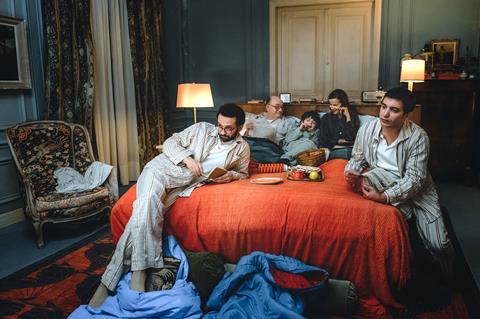Lionel Baier makes his first appearance in Berlin competition

Dir: Lionel Baier. Switzerland/Luxembourg/France. 2025. 92mins
As the student protests of May 1968 tear through the streets of Paris, an eight-year-old boy (Ethan Chimienti) is delighted to hole up with his grandparents, his two uncles and his larger-than-life Odessa-born Jewish great-grandmother in their Bohemian and decidedly down-at-heel mansion in the city’s upscale Rue-de-Grenelle. Then the reassuring but insular eccentricity of the family is disrupted by an unexpected visitor pleading for shelter. The latest from Swiss filmmaker Lionel Baier is adapted from the 2015 Prix Femina-winning memoir La Cache, written by Christophe Botanski (who was the child in the story). Like the family home, the film is cluttered and self-consciously quirky, but fans of the book may connect with the atmospheric chaos of the storytelling.
Cluttered and self-consciously quirky
This is the first appearance in Berlin’s main competition for Baier, whose most recent features, Continental Drift (South) and Vanity, both premiered in Cannes. Rambling, verbose and perhaps a little self-satisfied, his latest picture will connect most successfully with French audiences; particularly those familiar with Botanski’s source material and with the author’s uncle, the renowned conceptual artist Christian Botanski, who is depicted at the very start of his career in this film. Elsewhere, the reception is likely to be muted for all but the most avid Francophiles.
A narration, seemingly attributable to the author of the film rather than the author of the story, sets the scene by acknowledging that the picture we are about to see is based on a book, which is based on a childhood. He then goes on to draw a large question mark over the credibility of the story, adopting a kind of Schrodinger’s cat approach to facts. “If you believe me,” the voice dissembles, “I will tell the truth.” Having cleared that up (or not, depending whether you can bring yourself to put your faith in the storytelling), the film, accompanied by a skittering jazz score, introduces the key characters.
The child’s parents – none of the characters are named, apart from the great-grandmother (Liliane Rovère), who is referred to within the family as ’Hinterland’ – are background players in the story. Caught up in the revolutionary fervour of the moment, they offload their child onto his grandparents. It’s a curious set up. Grandpapa (Michel Blanc) is a respected doctor who, according to his family, is overdue recognition by the governing medical body. Grandpapa, however, is a timid creature who ends up cowering under the table and covered in meat juices during a lunch with his esteemed colleagues.
In contrast, Grandmama (Dominique Reymond) is resourceful and dynamic; she’s not about to let the fact of her disability (she has partial paralysis in her leg) get in the way of battling on behalf of her family. She negotiates the sale of her younger son’s paintings from the safety of the family car; years before, she devised an ingenious scheme to protect her Jewish husband from the occupying Nazi forces. Then there’s Hinterland, who is partial to vodka and loyal to Odessa above all other places, even Paris.
It’s a supportive, close-knit family environment, and one which is not entirely healthy. The two uncles, Great-Uncle (William Lebghil) and Little-Uncle (Aurélien Gabrielli), seem half-formed as adults, rather too comfortable in the domestic nest to strike out on their own. And who can blame them? Véronique Sacrez’s dense, detailed production design captures the idiosyncratic personality of the home they all share, an opulent but rather grubby maze of rooms, piled high with books and art; reverberating with confidently voiced opinions and, in Hinterland’s quarters, classical music by Russian composers played at ear-splitting volumes.
Baier nods to the period in which the film is set with a smattering of playful New Wave flourishes. But ultimately the film, like the inhabitants of the Rue-de-Grenelle mansion, doesn’t really go anywhere.
Production company: Bande à part Films
International sales: MK2 films intlsales@mk2.com
Producers: Agnieszka Ramu, Laetitia Gonzalez, Yaël Fogiel, Vincent Quénault, Jeanne Geiben
Screenplay: Lionel Baier, Catherine Charrier
Cinematography: Patrick Lindenmaier
Production design: Véronique Sacrez
Editing: Pauline Gaillard
Music: Diego Baldenweg, Nora Baldenweg, Lionel Baldenweg
Main cast: Dominique Reymond, Michel Blanc, William Lebghil, Aurélien Gabrielli, Liliane Rovère, Ethan Chimienti, Adrien Barazzone, Larisa Faber






![The Brightest SunScreen[Courtesy HKIFF]](https://d1nslcd7m2225b.cloudfront.net/Pictures/274x183/3/5/0/1448350_thebrightestsunscreencourtesyhkiff_312678.jpg)















![The Brightest SunScreen[Courtesy HKIFF]](https://d1nslcd7m2225b.cloudfront.net/Pictures/100x67/3/5/0/1448350_thebrightestsunscreencourtesyhkiff_312678.jpg)


No comments yet